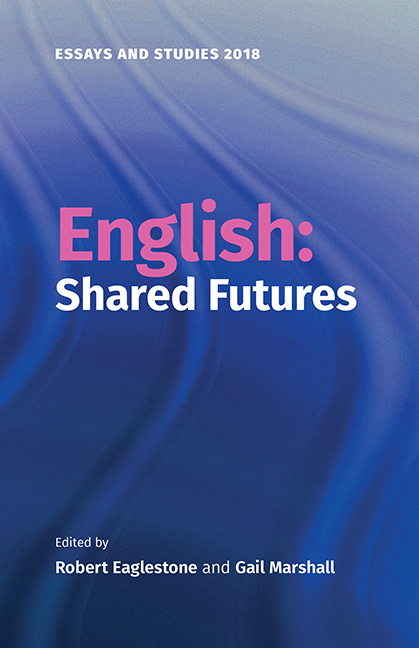Book contents
- Frontmatter
- Contents
- Notes on Contributors
- Acknowledgements
- Abbreviations
- Introduction
- The Changing Picture of School English
- From A-Level to HE: Working Towards a Shared Future?
- English Outreach: Academics in the Classroom
- From Provider to Stager: The Future of Teaching English in HE
- Pedagogic Criticism: An Introduction
- Exquisite Tensions – Narrating the BAME ECA Experience
- Postgraduate Futures: Voices and Views
- Shared Futures: Early Career Academics in English Studies
- Some Reflections on the Funding of English Departments
- English: The Future of Publishing
- Digital Futures
- A View from the United States: The Crisis in the Humanities; the Liberal Arts; and English in the Military Academy
- The Future of Borders
- ‘Between and Across Languages’: Writing in Scotland and Wales
- Exploring Intersections between Creative and Critical Writing: An Interview with Elleke Boehmer
- Integrating English
- Employability in English Studies
- Creative Living: How Creative Writing Courses Help to Prepare for Life-long Careers
- Practice at Large: How Creative Writing can Enhance University Research Environments
- ‘And who can turn away?’ Witnessing a Shared Dystopia
- English and the Public Good
- ‘Can Wisdom be put in a silver rod? / Or Love in a golden bowl?’ On Not Defending the Humanities
- ‘Something Real to Carry Home When Day Is Done’: The Reader in Future
- Afterword
- Index
The Future of Borders
Published online by Cambridge University Press: 15 October 2019
- Frontmatter
- Contents
- Notes on Contributors
- Acknowledgements
- Abbreviations
- Introduction
- The Changing Picture of School English
- From A-Level to HE: Working Towards a Shared Future?
- English Outreach: Academics in the Classroom
- From Provider to Stager: The Future of Teaching English in HE
- Pedagogic Criticism: An Introduction
- Exquisite Tensions – Narrating the BAME ECA Experience
- Postgraduate Futures: Voices and Views
- Shared Futures: Early Career Academics in English Studies
- Some Reflections on the Funding of English Departments
- English: The Future of Publishing
- Digital Futures
- A View from the United States: The Crisis in the Humanities; the Liberal Arts; and English in the Military Academy
- The Future of Borders
- ‘Between and Across Languages’: Writing in Scotland and Wales
- Exploring Intersections between Creative and Critical Writing: An Interview with Elleke Boehmer
- Integrating English
- Employability in English Studies
- Creative Living: How Creative Writing Courses Help to Prepare for Life-long Careers
- Practice at Large: How Creative Writing can Enhance University Research Environments
- ‘And who can turn away?’ Witnessing a Shared Dystopia
- English and the Public Good
- ‘Can Wisdom be put in a silver rod? / Or Love in a golden bowl?’ On Not Defending the Humanities
- ‘Something Real to Carry Home When Day Is Done’: The Reader in Future
- Afterword
- Index
Summary
In May 2014, the then-Education Secretary Michael Gove sparked controversy by proposing to effectively restrict the ‘Post-1914’ section of the GCSE English curriculum to ‘fiction or drama written in the British Isles’. The decision was met with anger from English teachers and literary scholars around the country. As Anna Hartnell argued, the policy – which would result in the cutting of texts such as Harper Lee's To Kill a Mockingbird, Arthur Miller's The Crucible and John Steinbeck's Of Mice and Men – is ‘not just parochial and regressive’, but
also fails to recognise the dynamics that make up modern Britain. It fails to understand that a large part of the value of reading literature lies precisely in the kind of empathic leap Scout makes at the end of Lee's novel, one that enables her to see herself through the eyes of an ‘other’ and so more fully comprehend her own identity.
The ferocity of the debate surrounding Gove's decision brought to the fore something quite singular about English as a core subject at GCSE level: namely, its centrality to collective feelings about British national identity. In contrast to Science and Maths (and, at least until 2015, when English Literature was made an optional GCSE, more intensely than other Arts and Humanities subjects), the debates that take place in the English Literature GCSE classroom are debates that actively and substantively contribute towards the construction of our national imaginary; or, in Bendict Anderson's often-cited phrase, our ‘imagined community’. What's more, three years on, this political row has taken on an extra degree of significance: in the wake of his stint in the Department for Education, Gove has proceeded to become one of Brexit's most outspoken champions. This development, of course, reveals an unnerving warning of things to come in his earlier GCSE English policy change, but, more importantly than this, it also reflects how crucial a role the subject of English plays in the way we conceptualise our national borders: not just in terms of immigration and the economy, but also, on a deeper, more paradigmatic level, in terms of how we demarcate Britishness itself and the values we perceive it to contain.
It is for this reason that English, and the decisions taken about the study of texts on school syllabi, occupy an important place in today's climate of uncertainty over the future of Britain's borders.
- Type
- Chapter
- Information
- English: Shared Futures , pp. 117 - 125Publisher: Boydell & BrewerPrint publication year: 2018

